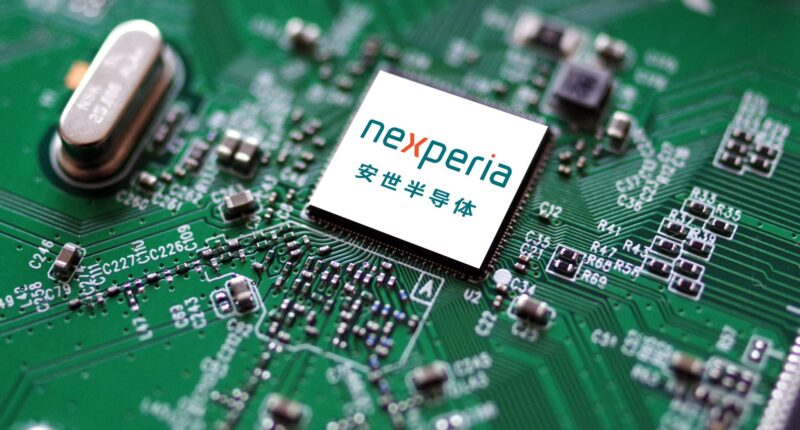Share this @internewscast.com
The logo of semiconductor manufacturer Nexperia is prominently displayed in a photo illustration on a screen.
Vcg | Visual China Group | Getty Images
On Monday, shares of Europe’s leading automotive manufacturers experienced a rise as concerns over a semiconductor shortage within the industry seemed to lessen.
China announced on Saturday that it would contemplate certain exemptions for the export of Nexperia chips. This development comes after the country had previously halted the export of these semiconductors following the Dutch government’s decision to take control of Nexperia, which is under the ownership of the Chinese firm Wingtech.
The tension between the Netherlands and China had previously alarmed automotive companies, who feared an exacerbation of the chip shortage crisis.
On Monday morning, stocks of France’s Renault, Germany’s Mercedes-Benz Group, and the Milan-listed shares of Stellantis, the maker of Jeep, all saw an increase of approximately 3% in trading.
Auto parts suppliers Valeo and Aumovio had advanced 3% and 1.6%, respectively, by around 11:30 a.m. London time (6:30 a.m. ET).
Germany’s Volkswagen, Porsche and BMW were also trading more than 1.3% higher.

Shares of Volkswagen over the last three months compared to other major European automakers.
Analysts at Barclays said developments over the weekend appeared to be “quite positive” for the automotive sector, with fears of significant disruption likely to be avoided.
“While the Nexperia issue is not fully resolved, with ongoing negotiations between the Dutch and Chinese government to determine a path forward for Nexperia, we believe the potential near-term production headwind has been remediated, although we await more details,” Dan Levy, senior autos analyst at Barclays, said in a research note published Monday.
The situation involving Nexperia began in September, when the Dutch government took control of the company, in what was seen as a highly unusual move, reportedly after the U.S. raised security concerns.
In making the decision, the Dutch government cited fears that technology from the company — which specializes in the high-volume production of chips used in automotive, consumer electronics and other industries — “would become unavailable in an emergency.”
China responded by blocking exports of the firm’s finished products.
German automakers are thought to be especially sensitive to Nexperia-related disruptions because they rely heavily on large, domestic suppliers, known as “Tier 1s,” and local production facilities and companies, such as Nexperia, despite much of its manufacturing moving to China.
Japan’s Honda Motor became the first known automaker to reduce production due to the problem last week.








